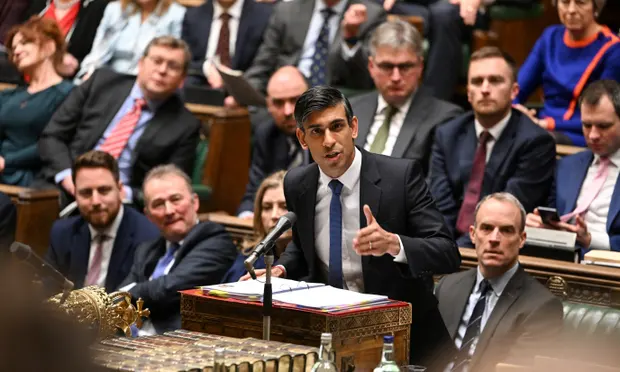A senior Brexiter minister has urged colleagues to give Rishi Sunak “time and space” to finish negotiations with the EU over the Northern Ireland protocol, as warnings grew of potential ministerial resignations.
Sunak has been told he is facing the possibility ministers may quit if his deal does not significantly rewrite the protocol or remove any powers for the European court of justice.
The home secretary, Suella Braverman, a former chair of the European Research Group of hardline pro-Brexit, MPs, made a pointed intervention on Monday to urge Sunak not to drop a controversial bill that gives the UK potential powers to unilaterally override the protocol.
But Caulfield also suggested it was right the protocol bill remained on the table. “Absolutely the Northern Ireland protocol bill was put in place as a mechanism to fall back on and that’s still going through parliament at the moment.”
Sunak met restive Conservative MPs in the Commons throughout Monday, which will continue over the coming days and the foreign secretary, James Cleverly, is expected to address the backbench 1922 Committee on Tuesday.
The Northern Ireland minister Steve Baker attended an ERG meeting on Monday. Sources say there was “a lot of fear of a sellout” but that there was also discussion of the damage a potential reopening of divisions would do to the future of the Conservative party at the polls.
One senior ERG source described Braverman’s intervention as “heartening”, as the first sign of cabinet tensions emerged over the prime minister’s proposed deal with the EU.
Jacob Rees-Mogg, a former cabinet minister and prominent Brexiter, said he had grave doubts about Sunak’s strategy. “There seems to me to be no point in bringing a deal that does not restore power-sharing. That must be the objective. If it doesn’t achieve that objective, I don’t understand why the government is spending political capital on something that won’t ultimately succeed,” he told ConservativeHome.
He said the protocol bill was “a much simpler route … which ensures that goods can go freely between GB and Northern Ireland.”
Rees-Mogg, an influential figure in the ERG, said Sunak was making the same mistakes on Brexit as one of his predecessors. “I don’t know why so much political capital has been spent on something without getting the DUP and the ERG on side first,” he said.
“It’s quite surprising, because this is very similar to what happened with Theresa May. They would hope that people just conveniently fall in behind the announced policy, and life doesn’t work like that. It’s important to get support for it first before you finalise the details. And that doesn’t seem to have been done here.”
Braverman, who gave legal advice to support the bill as attorney general, told the BBC: “We’ve been aware for some time now of challenges relating to trade, customs and sovereignty when it comes to Northern Ireland and the NI protocol.
“The legislation that the government introduced is one of the biggest tools we have in solving the problem on the Irish Sea.”
Senior Conservatives, including those supportive of Sunak, suggested there was little point in progressing without the support of the Democratic Unionists.
“The purpose of the negotiations was to get a deal that would allow DUP to go back into government in Stormont,” one former cabinet minister said. “So DUP support for a deal is the key. Without DUP support, it is pointless.”
David Jones, the deputy chair of the ERG, said: “The problem is that DUP has told No 10 that whatever they agree needs to meet the ‘seven tests’.
“One of those is that the people of Northern Ireland have to have a say in the laws that govern them, but it is hard to see how they do that without an entirely new agreement. What they are talking about now is some sort of new interpretation of the existing agreement, not a completely new one.”
Jones said he understood the DUP had asked to see the text of the full agreement – rather than the political framework – in order to move forward. That request is unlikely to be accepted.
The protocol bill, the brainchild of Liz Truss when she was foreign secretary, would allow the UK to unilaterally override parts of the Brexit treaty, and discarding the bill is seen as a gesture of goodwill when agreement is reached on application of the protocol.



